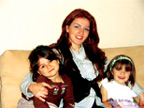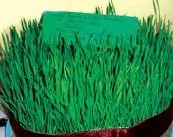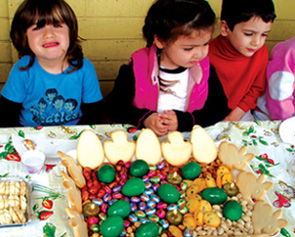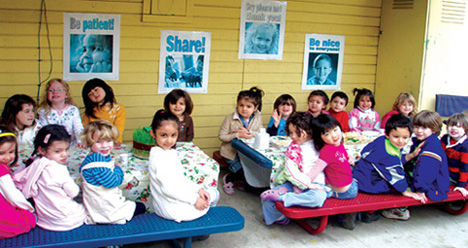|

Volume 15.1
Page
61
Four-Year-Olds
Enjoy Novruz
By Lala Baloghlanova
  This is the first spring for my four-year-old
daughter Fira at her new preschool in Santa Monica, California.
When I began making arrangements for Novruz (First Day of Spring,
March 21st), Fira was so eager to share our Azerbaijani holiday
traditions with her friends at school. They come from many countries
including India, China and Japan. Fira is the first Azerbaijani
ever to attend her school. This is the first spring for my four-year-old
daughter Fira at her new preschool in Santa Monica, California.
When I began making arrangements for Novruz (First Day of Spring,
March 21st), Fira was so eager to share our Azerbaijani holiday
traditions with her friends at school. They come from many countries
including India, China and Japan. Fira is the first Azerbaijani
ever to attend her school.
One week before Novruz, I brought a plate of "samani"
to school. Fira and I had planted the wheat berries together
a few days earlier. Very soon the seeds grew into the emerald
patch of grass, symbolizing the coming of the new planting season
- Spring Equinox.
Above:
Lala Baloghlanova, author
of article, with her two daughters, Fira 4, and Farrah, 3, who
helped her prepare the Novruz treats to share at school.
  It seems
the children, too, were conscious of nature although the sprouts
had barely started to appear. When Fira's teacher first saw what
we had planted, she called it "grass cake". Fira giggled
and insisted: "This is 'samani'!" My daughter was so
happy. Now her friends could see some of the traditions from
her country. It seems
the children, too, were conscious of nature although the sprouts
had barely started to appear. When Fira's teacher first saw what
we had planted, she called it "grass cake". Fira giggled
and insisted: "This is 'samani'!" My daughter was so
happy. Now her friends could see some of the traditions from
her country.
Every day, the children carefully watched and watered the "samani".
It wasn't long before the wheat grass had sprouted five to six
inches right in front of their eyes. It looked like a patch of
grass growing on a plate.
Above:
The wheat grass or "samani"
as it is called in Azeri. Traditionally, each family grows "samani"
at Novruz, to celebrate the first day of Spring, March 21st.
On the day before Novruz, Fira and I began dyeing eggs. This
is a tradition much like dyeing Easter eggs. Fira loved dipping
the eggs into the bowls of food coloring. The next day we arranged
a tray (called "khoncha" in Azeri) of traditional sweets
and headed off to school. The tray was filled with cookies, candles,
colored eggs and nuts. It was a gorgeous day - full of light
and sunshine. When we arrived at school, a crowd of noisy and
curious kids gathered round us.
  Fira
marched right through the group, holding her head up proudly,
as if saying: "This is what I was telling you about Azerbaijan!"
We placed the tray on the table, and children were eager to hear
about this holiday of "grass" and cookies in Fira's
country. Fira
marched right through the group, holding her head up proudly,
as if saying: "This is what I was telling you about Azerbaijan!"
We placed the tray on the table, and children were eager to hear
about this holiday of "grass" and cookies in Fira's
country.
I mentioned about other traditions associated with Novruz, too.
Not just "samani". The boys wanted to hear more about
jumping over bonfires. This practice symbolizes leaving behind
the badness of the previous year and the hope of building good
relationships in the new year. It's called "Charshanba Akhshami"
and is observed on the four Tuesdays, before March 20 and 21st.
These Tuesdays, in turn, are distinguished from each other -
"Water Tuesday" (Su Charshanba), "Fire Tuesday"
(Od Charshanba), "Earth Tuesday" (Torpag Chershanba)
and "Last Tuesday" (Akhir Charshanba) which is considered
the most important one.
Above:
Azerbaijanis dye eggs, much
like "Easter eggs" and extend trays of sweets to guests
during Novruz Holidays.
On the last Tuesday, children place their hats in front of neighbors'
doors and then rush to hide so that their identity will be kept
a secret. Neighbors fill the hats with sweets and then the children
come back to retrieve them. It's quite like Halloween.

Above:
Pre-school children at the
Bright Start Learning Center in Santa Monica,
California, where Fira Baloghlanova, 4, shared Novruz traditions
with her fellow classmates.
Fira explained what to do with the eggs - tapping them against
each other. It's a favorite with kids. Each person chooses a
colored egg, trying to determine which one has the hardest shell
and then they tap their egg against someone else's, trying to
crack it. The person whose egg doesn't crack for the longest
amount of time is declared the winner.
I overheard Fira and her friends talking about these traditions.
Inquisitive Will was concerned: "But isn't it dangerous
to jump over a fire?"
Fira: "We make little bonfires for little children."
Michael: "Can everybody jump over the fires?! Even kids!"
Fira: "Of course!"
Then Egle, the teacher, asked Fira: "What's the best thing
about your country?"
Fira thought a bit and then answered: "When you go outside,
there are lots of people there, and everybody talks and plays
together." (I'm sure she was referring to the gatherings
with our large extended family when all the cousins, aunts and
uncles, grandmas and grandpas come together).
This sounded exciting to Charlotte: "Can I come to Azerbaijan
with you one day?"
Happy Fira: "When we're done here, we'll go back home and
I'll take you with me. (Fira understands that one day her daddy's
assignment at the consulate in Los Angeles will be over, and
we'll move back to Baku).
Daniel, who is always so quiet, piped up: "I would like
to go to Azerbaijan to jump over a bonfire." And then, he
added - ever to meekly - "a little fire, just a little one."
____
Back
Index AI 15.1
AI Home
| Magazine
Choice
| Topics
| AI Store | Contact us
Other Web sites
created by Azerbaijan International
AZgallery.org | AZERI.org | HAJIBEYOV.com
|